Business Portfolio: Leadership, Time Management, Group Work
VerifiedAdded on 2020/10/22
|18
|6756
|215
Report
AI Summary
This report presents a reflective business portfolio, detailing a student's journey through leadership, time management, and group working workshops. It analyzes the application of learning theories such as Social Learning, Experiential Learning, and Self-Directed Learning, demonstrating how these concepts influenced the individual's behavior and skill development. The report includes reflections on specific activities, such as group work with team roles, time management practices, and leadership role-playing exercises. It highlights the student's learning experiences, strengths, and areas for improvement, such as presentation, communication, and collaborative working skills. Furthermore, a personal development plan is outlined, including judgment criteria, current and target proficiencies, development opportunities, and a timeline for improvement, providing a structured approach to enhance the skills necessary for professional growth and effective performance in a business setting.
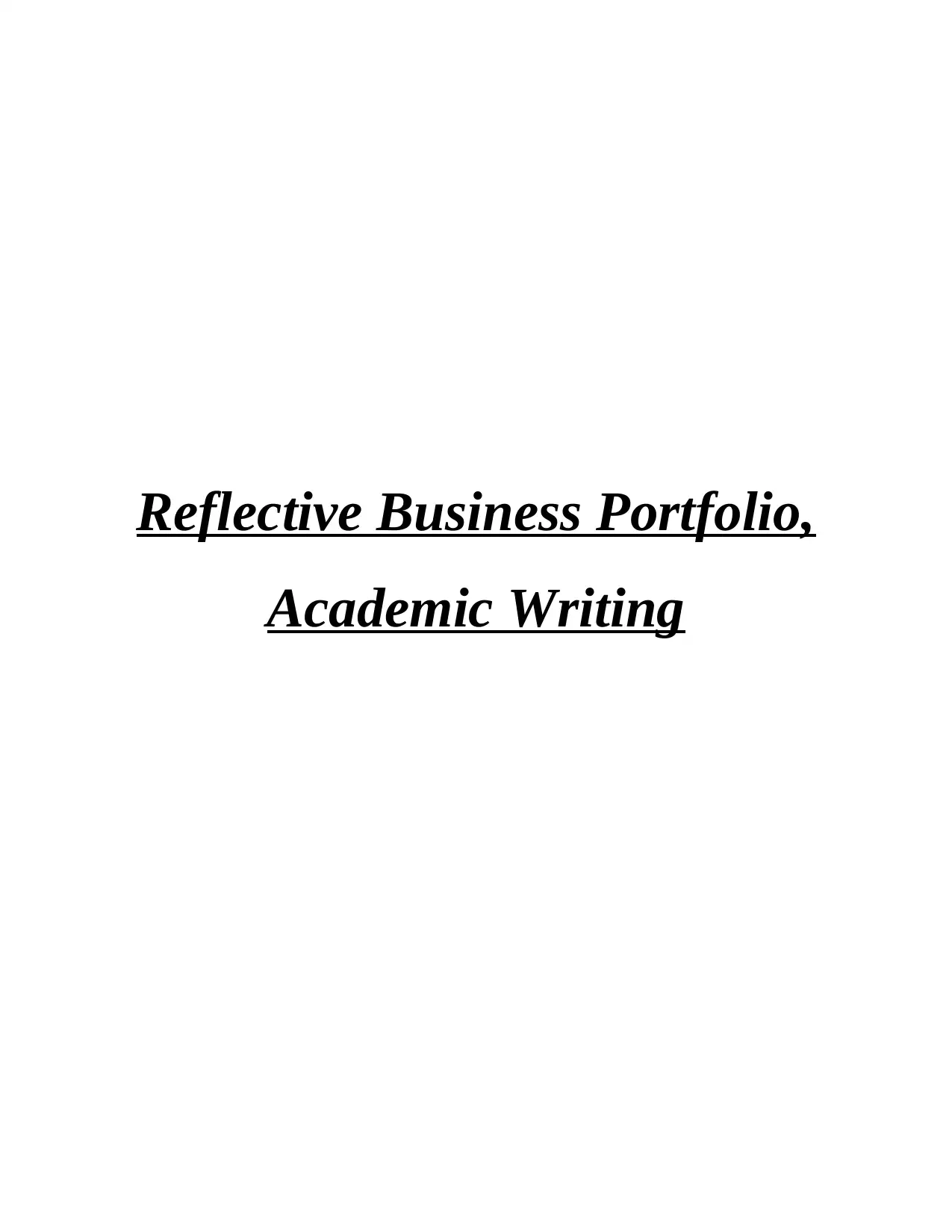
Reflective Business Portfolio,
Academic Writing
Academic Writing
Paraphrase This Document
Need a fresh take? Get an instant paraphrase of this document with our AI Paraphraser
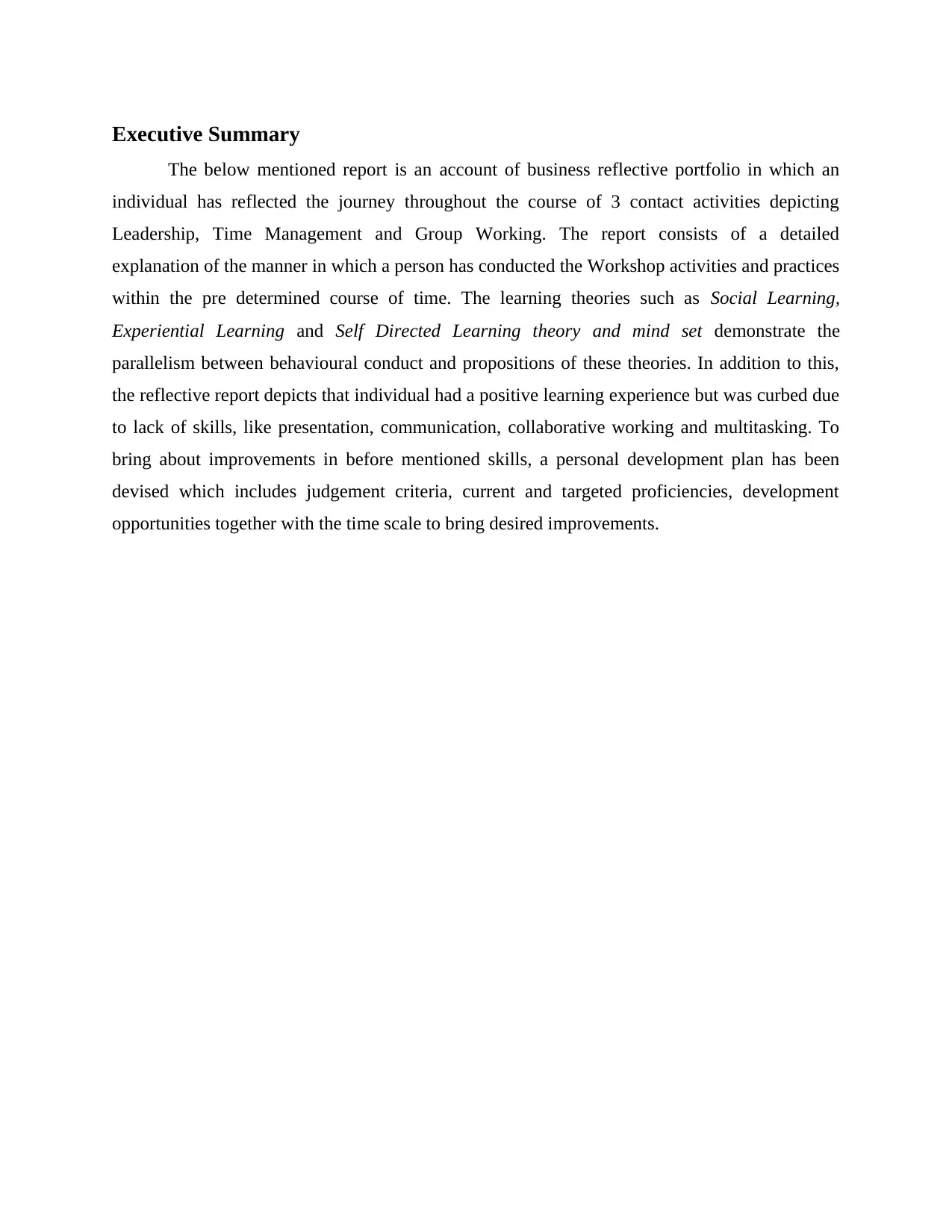
Executive Summary
The below mentioned report is an account of business reflective portfolio in which an
individual has reflected the journey throughout the course of 3 contact activities depicting
Leadership, Time Management and Group Working. The report consists of a detailed
explanation of the manner in which a person has conducted the Workshop activities and practices
within the pre determined course of time. The learning theories such as Social Learning,
Experiential Learning and Self Directed Learning theory and mind set demonstrate the
parallelism between behavioural conduct and propositions of these theories. In addition to this,
the reflective report depicts that individual had a positive learning experience but was curbed due
to lack of skills, like presentation, communication, collaborative working and multitasking. To
bring about improvements in before mentioned skills, a personal development plan has been
devised which includes judgement criteria, current and targeted proficiencies, development
opportunities together with the time scale to bring desired improvements.
The below mentioned report is an account of business reflective portfolio in which an
individual has reflected the journey throughout the course of 3 contact activities depicting
Leadership, Time Management and Group Working. The report consists of a detailed
explanation of the manner in which a person has conducted the Workshop activities and practices
within the pre determined course of time. The learning theories such as Social Learning,
Experiential Learning and Self Directed Learning theory and mind set demonstrate the
parallelism between behavioural conduct and propositions of these theories. In addition to this,
the reflective report depicts that individual had a positive learning experience but was curbed due
to lack of skills, like presentation, communication, collaborative working and multitasking. To
bring about improvements in before mentioned skills, a personal development plan has been
devised which includes judgement criteria, current and targeted proficiencies, development
opportunities together with the time scale to bring desired improvements.
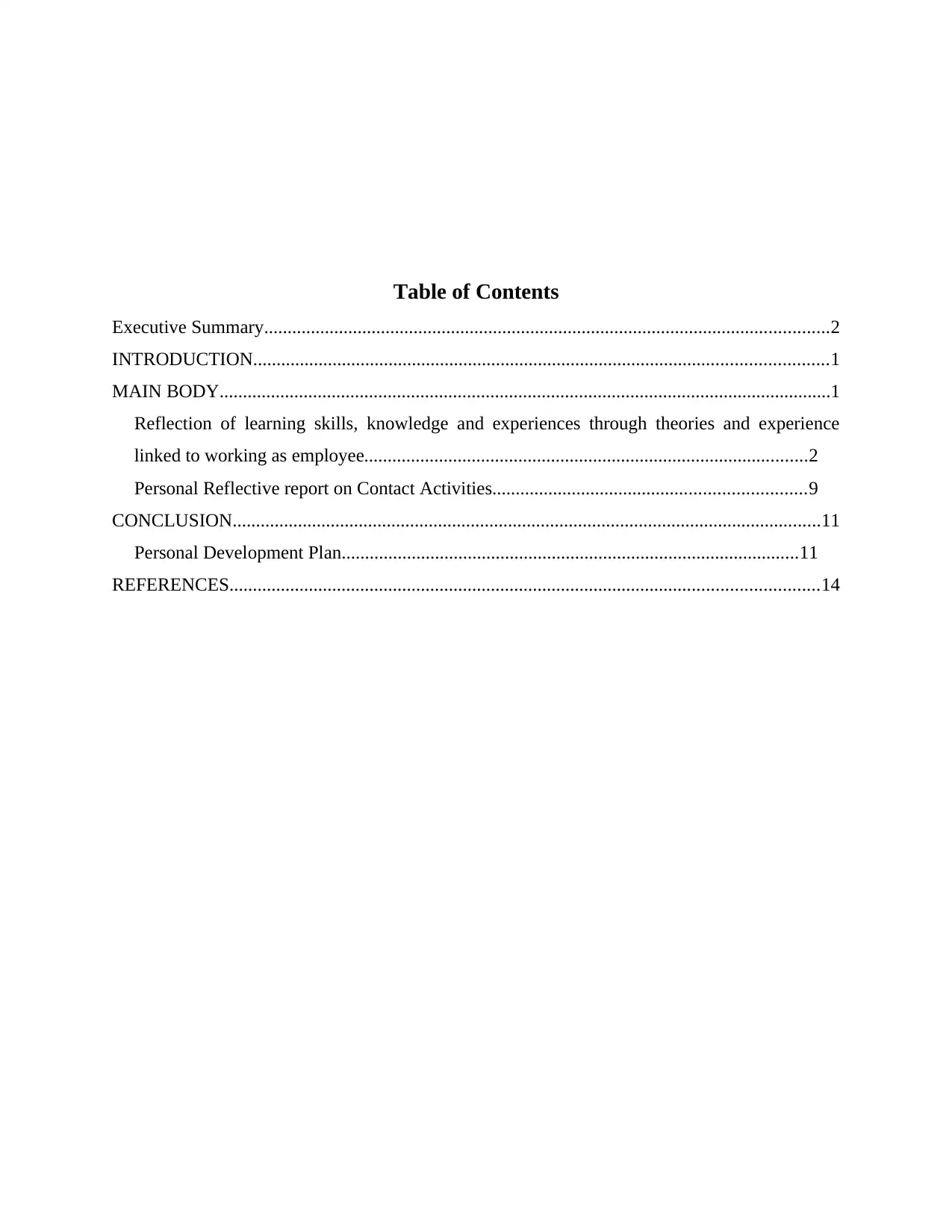
Table of Contents
Executive Summary.........................................................................................................................2
INTRODUCTION...........................................................................................................................1
MAIN BODY...................................................................................................................................1
Reflection of learning skills, knowledge and experiences through theories and experience
linked to working as employee...............................................................................................2
Personal Reflective report on Contact Activities...................................................................9
CONCLUSION..............................................................................................................................11
Personal Development Plan..................................................................................................11
REFERENCES..............................................................................................................................14
Executive Summary.........................................................................................................................2
INTRODUCTION...........................................................................................................................1
MAIN BODY...................................................................................................................................1
Reflection of learning skills, knowledge and experiences through theories and experience
linked to working as employee...............................................................................................2
Personal Reflective report on Contact Activities...................................................................9
CONCLUSION..............................................................................................................................11
Personal Development Plan..................................................................................................11
REFERENCES..............................................................................................................................14
⊘ This is a preview!⊘
Do you want full access?
Subscribe today to unlock all pages.

Trusted by 1+ million students worldwide

Paraphrase This Document
Need a fresh take? Get an instant paraphrase of this document with our AI Paraphraser
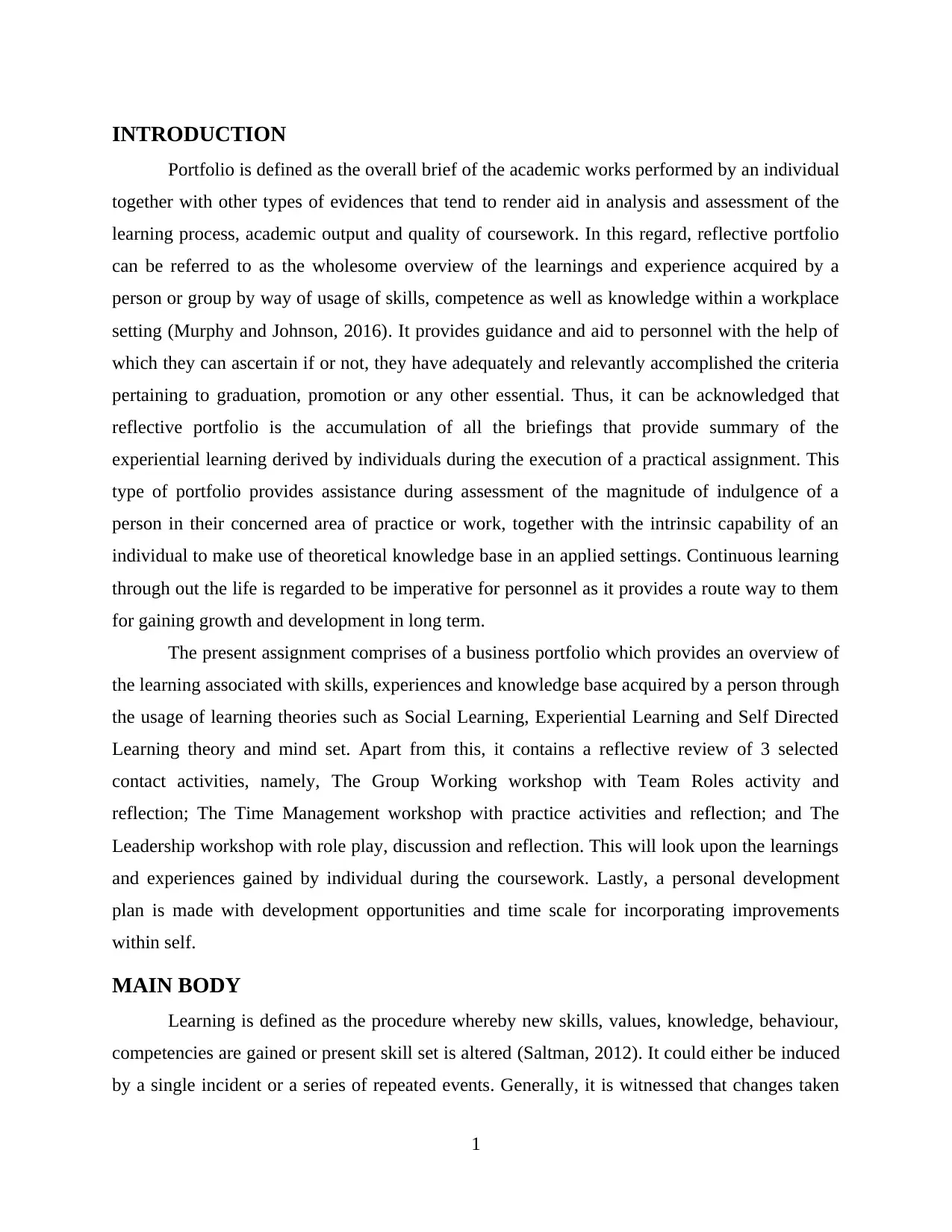
INTRODUCTION
Portfolio is defined as the overall brief of the academic works performed by an individual
together with other types of evidences that tend to render aid in analysis and assessment of the
learning process, academic output and quality of coursework. In this regard, reflective portfolio
can be referred to as the wholesome overview of the learnings and experience acquired by a
person or group by way of usage of skills, competence as well as knowledge within a workplace
setting (Murphy and Johnson, 2016). It provides guidance and aid to personnel with the help of
which they can ascertain if or not, they have adequately and relevantly accomplished the criteria
pertaining to graduation, promotion or any other essential. Thus, it can be acknowledged that
reflective portfolio is the accumulation of all the briefings that provide summary of the
experiential learning derived by individuals during the execution of a practical assignment. This
type of portfolio provides assistance during assessment of the magnitude of indulgence of a
person in their concerned area of practice or work, together with the intrinsic capability of an
individual to make use of theoretical knowledge base in an applied settings. Continuous learning
through out the life is regarded to be imperative for personnel as it provides a route way to them
for gaining growth and development in long term.
The present assignment comprises of a business portfolio which provides an overview of
the learning associated with skills, experiences and knowledge base acquired by a person through
the usage of learning theories such as Social Learning, Experiential Learning and Self Directed
Learning theory and mind set. Apart from this, it contains a reflective review of 3 selected
contact activities, namely, The Group Working workshop with Team Roles activity and
reflection; The Time Management workshop with practice activities and reflection; and The
Leadership workshop with role play, discussion and reflection. This will look upon the learnings
and experiences gained by individual during the coursework. Lastly, a personal development
plan is made with development opportunities and time scale for incorporating improvements
within self.
MAIN BODY
Learning is defined as the procedure whereby new skills, values, knowledge, behaviour,
competencies are gained or present skill set is altered (Saltman, 2012). It could either be induced
by a single incident or a series of repeated events. Generally, it is witnessed that changes taken
1
Portfolio is defined as the overall brief of the academic works performed by an individual
together with other types of evidences that tend to render aid in analysis and assessment of the
learning process, academic output and quality of coursework. In this regard, reflective portfolio
can be referred to as the wholesome overview of the learnings and experience acquired by a
person or group by way of usage of skills, competence as well as knowledge within a workplace
setting (Murphy and Johnson, 2016). It provides guidance and aid to personnel with the help of
which they can ascertain if or not, they have adequately and relevantly accomplished the criteria
pertaining to graduation, promotion or any other essential. Thus, it can be acknowledged that
reflective portfolio is the accumulation of all the briefings that provide summary of the
experiential learning derived by individuals during the execution of a practical assignment. This
type of portfolio provides assistance during assessment of the magnitude of indulgence of a
person in their concerned area of practice or work, together with the intrinsic capability of an
individual to make use of theoretical knowledge base in an applied settings. Continuous learning
through out the life is regarded to be imperative for personnel as it provides a route way to them
for gaining growth and development in long term.
The present assignment comprises of a business portfolio which provides an overview of
the learning associated with skills, experiences and knowledge base acquired by a person through
the usage of learning theories such as Social Learning, Experiential Learning and Self Directed
Learning theory and mind set. Apart from this, it contains a reflective review of 3 selected
contact activities, namely, The Group Working workshop with Team Roles activity and
reflection; The Time Management workshop with practice activities and reflection; and The
Leadership workshop with role play, discussion and reflection. This will look upon the learnings
and experiences gained by individual during the coursework. Lastly, a personal development
plan is made with development opportunities and time scale for incorporating improvements
within self.
MAIN BODY
Learning is defined as the procedure whereby new skills, values, knowledge, behaviour,
competencies are gained or present skill set is altered (Saltman, 2012). It could either be induced
by a single incident or a series of repeated events. Generally, it is witnessed that changes taken
1
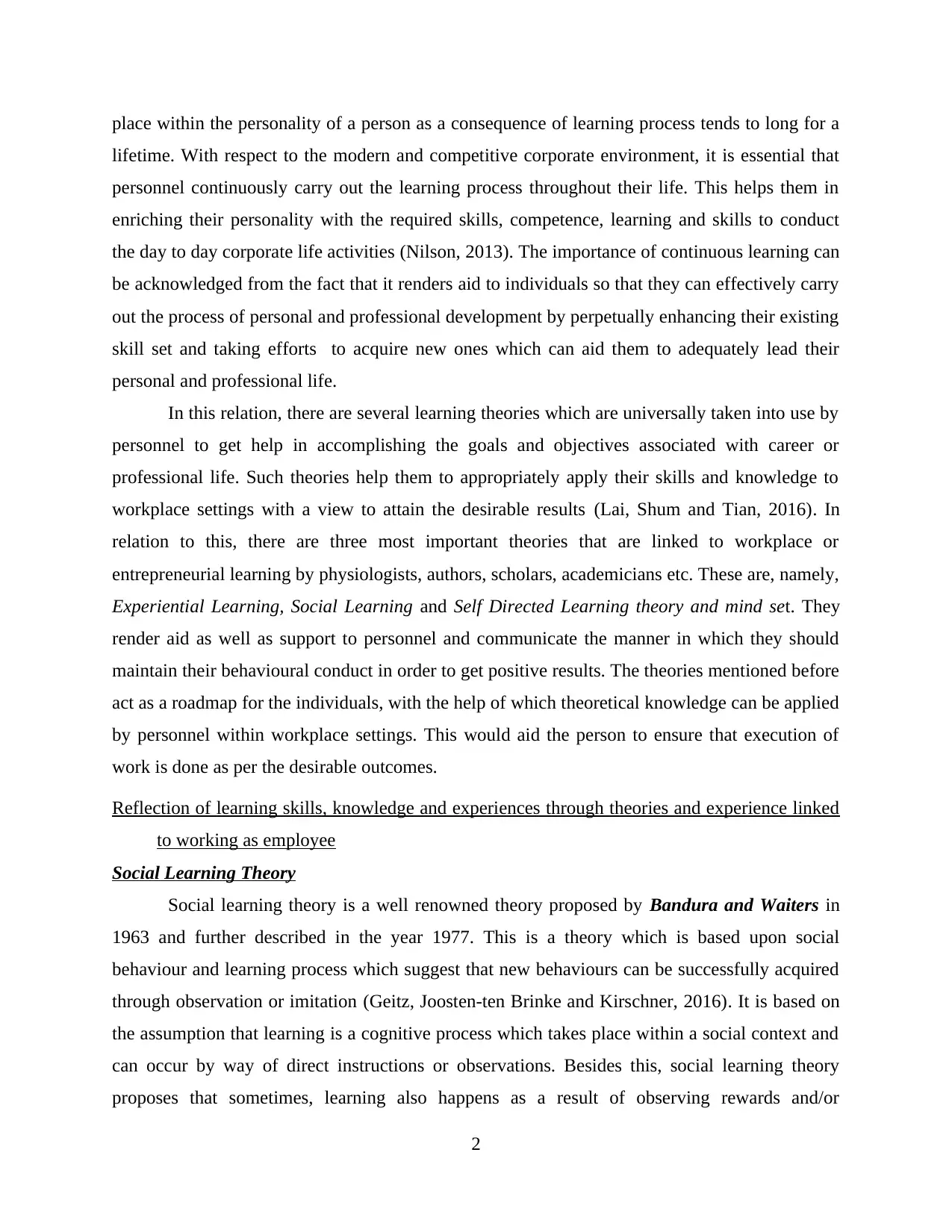
place within the personality of a person as a consequence of learning process tends to long for a
lifetime. With respect to the modern and competitive corporate environment, it is essential that
personnel continuously carry out the learning process throughout their life. This helps them in
enriching their personality with the required skills, competence, learning and skills to conduct
the day to day corporate life activities (Nilson, 2013). The importance of continuous learning can
be acknowledged from the fact that it renders aid to individuals so that they can effectively carry
out the process of personal and professional development by perpetually enhancing their existing
skill set and taking efforts to acquire new ones which can aid them to adequately lead their
personal and professional life.
In this relation, there are several learning theories which are universally taken into use by
personnel to get help in accomplishing the goals and objectives associated with career or
professional life. Such theories help them to appropriately apply their skills and knowledge to
workplace settings with a view to attain the desirable results (Lai, Shum and Tian, 2016). In
relation to this, there are three most important theories that are linked to workplace or
entrepreneurial learning by physiologists, authors, scholars, academicians etc. These are, namely,
Experiential Learning, Social Learning and Self Directed Learning theory and mind set. They
render aid as well as support to personnel and communicate the manner in which they should
maintain their behavioural conduct in order to get positive results. The theories mentioned before
act as a roadmap for the individuals, with the help of which theoretical knowledge can be applied
by personnel within workplace settings. This would aid the person to ensure that execution of
work is done as per the desirable outcomes.
Reflection of learning skills, knowledge and experiences through theories and experience linked
to working as employee
Social Learning Theory
Social learning theory is a well renowned theory proposed by Bandura and Waiters in
1963 and further described in the year 1977. This is a theory which is based upon social
behaviour and learning process which suggest that new behaviours can be successfully acquired
through observation or imitation (Geitz, Joosten-ten Brinke and Kirschner, 2016). It is based on
the assumption that learning is a cognitive process which takes place within a social context and
can occur by way of direct instructions or observations. Besides this, social learning theory
proposes that sometimes, learning also happens as a result of observing rewards and/or
2
lifetime. With respect to the modern and competitive corporate environment, it is essential that
personnel continuously carry out the learning process throughout their life. This helps them in
enriching their personality with the required skills, competence, learning and skills to conduct
the day to day corporate life activities (Nilson, 2013). The importance of continuous learning can
be acknowledged from the fact that it renders aid to individuals so that they can effectively carry
out the process of personal and professional development by perpetually enhancing their existing
skill set and taking efforts to acquire new ones which can aid them to adequately lead their
personal and professional life.
In this relation, there are several learning theories which are universally taken into use by
personnel to get help in accomplishing the goals and objectives associated with career or
professional life. Such theories help them to appropriately apply their skills and knowledge to
workplace settings with a view to attain the desirable results (Lai, Shum and Tian, 2016). In
relation to this, there are three most important theories that are linked to workplace or
entrepreneurial learning by physiologists, authors, scholars, academicians etc. These are, namely,
Experiential Learning, Social Learning and Self Directed Learning theory and mind set. They
render aid as well as support to personnel and communicate the manner in which they should
maintain their behavioural conduct in order to get positive results. The theories mentioned before
act as a roadmap for the individuals, with the help of which theoretical knowledge can be applied
by personnel within workplace settings. This would aid the person to ensure that execution of
work is done as per the desirable outcomes.
Reflection of learning skills, knowledge and experiences through theories and experience linked
to working as employee
Social Learning Theory
Social learning theory is a well renowned theory proposed by Bandura and Waiters in
1963 and further described in the year 1977. This is a theory which is based upon social
behaviour and learning process which suggest that new behaviours can be successfully acquired
through observation or imitation (Geitz, Joosten-ten Brinke and Kirschner, 2016). It is based on
the assumption that learning is a cognitive process which takes place within a social context and
can occur by way of direct instructions or observations. Besides this, social learning theory
proposes that sometimes, learning also happens as a result of observing rewards and/or
2
⊘ This is a preview!⊘
Do you want full access?
Subscribe today to unlock all pages.

Trusted by 1+ million students worldwide
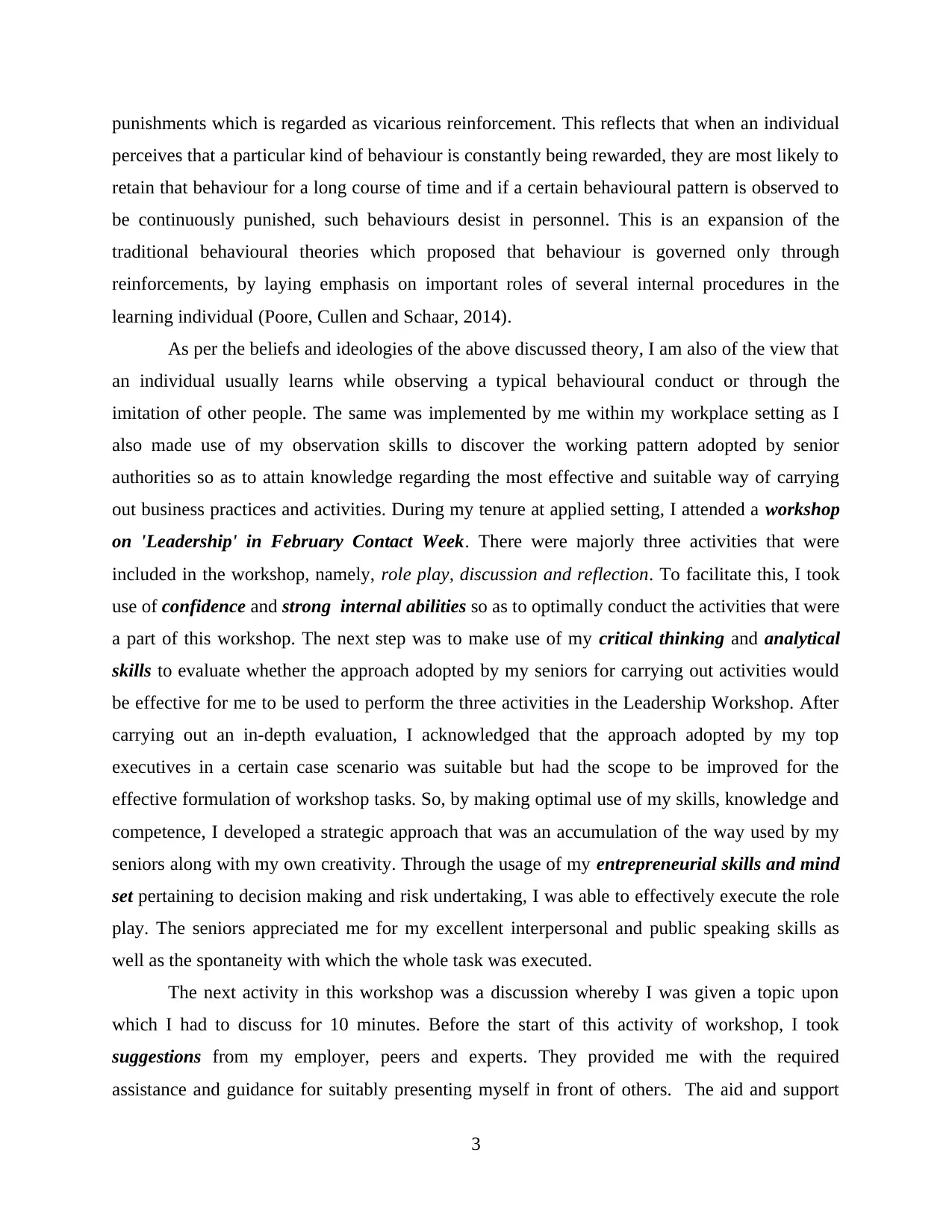
punishments which is regarded as vicarious reinforcement. This reflects that when an individual
perceives that a particular kind of behaviour is constantly being rewarded, they are most likely to
retain that behaviour for a long course of time and if a certain behavioural pattern is observed to
be continuously punished, such behaviours desist in personnel. This is an expansion of the
traditional behavioural theories which proposed that behaviour is governed only through
reinforcements, by laying emphasis on important roles of several internal procedures in the
learning individual (Poore, Cullen and Schaar, 2014).
As per the beliefs and ideologies of the above discussed theory, I am also of the view that
an individual usually learns while observing a typical behavioural conduct or through the
imitation of other people. The same was implemented by me within my workplace setting as I
also made use of my observation skills to discover the working pattern adopted by senior
authorities so as to attain knowledge regarding the most effective and suitable way of carrying
out business practices and activities. During my tenure at applied setting, I attended a workshop
on 'Leadership' in February Contact Week. There were majorly three activities that were
included in the workshop, namely, role play, discussion and reflection. To facilitate this, I took
use of confidence and strong internal abilities so as to optimally conduct the activities that were
a part of this workshop. The next step was to make use of my critical thinking and analytical
skills to evaluate whether the approach adopted by my seniors for carrying out activities would
be effective for me to be used to perform the three activities in the Leadership Workshop. After
carrying out an in-depth evaluation, I acknowledged that the approach adopted by my top
executives in a certain case scenario was suitable but had the scope to be improved for the
effective formulation of workshop tasks. So, by making optimal use of my skills, knowledge and
competence, I developed a strategic approach that was an accumulation of the way used by my
seniors along with my own creativity. Through the usage of my entrepreneurial skills and mind
set pertaining to decision making and risk undertaking, I was able to effectively execute the role
play. The seniors appreciated me for my excellent interpersonal and public speaking skills as
well as the spontaneity with which the whole task was executed.
The next activity in this workshop was a discussion whereby I was given a topic upon
which I had to discuss for 10 minutes. Before the start of this activity of workshop, I took
suggestions from my employer, peers and experts. They provided me with the required
assistance and guidance for suitably presenting myself in front of others. The aid and support
3
perceives that a particular kind of behaviour is constantly being rewarded, they are most likely to
retain that behaviour for a long course of time and if a certain behavioural pattern is observed to
be continuously punished, such behaviours desist in personnel. This is an expansion of the
traditional behavioural theories which proposed that behaviour is governed only through
reinforcements, by laying emphasis on important roles of several internal procedures in the
learning individual (Poore, Cullen and Schaar, 2014).
As per the beliefs and ideologies of the above discussed theory, I am also of the view that
an individual usually learns while observing a typical behavioural conduct or through the
imitation of other people. The same was implemented by me within my workplace setting as I
also made use of my observation skills to discover the working pattern adopted by senior
authorities so as to attain knowledge regarding the most effective and suitable way of carrying
out business practices and activities. During my tenure at applied setting, I attended a workshop
on 'Leadership' in February Contact Week. There were majorly three activities that were
included in the workshop, namely, role play, discussion and reflection. To facilitate this, I took
use of confidence and strong internal abilities so as to optimally conduct the activities that were
a part of this workshop. The next step was to make use of my critical thinking and analytical
skills to evaluate whether the approach adopted by my seniors for carrying out activities would
be effective for me to be used to perform the three activities in the Leadership Workshop. After
carrying out an in-depth evaluation, I acknowledged that the approach adopted by my top
executives in a certain case scenario was suitable but had the scope to be improved for the
effective formulation of workshop tasks. So, by making optimal use of my skills, knowledge and
competence, I developed a strategic approach that was an accumulation of the way used by my
seniors along with my own creativity. Through the usage of my entrepreneurial skills and mind
set pertaining to decision making and risk undertaking, I was able to effectively execute the role
play. The seniors appreciated me for my excellent interpersonal and public speaking skills as
well as the spontaneity with which the whole task was executed.
The next activity in this workshop was a discussion whereby I was given a topic upon
which I had to discuss for 10 minutes. Before the start of this activity of workshop, I took
suggestions from my employer, peers and experts. They provided me with the required
assistance and guidance for suitably presenting myself in front of others. The aid and support
3
Paraphrase This Document
Need a fresh take? Get an instant paraphrase of this document with our AI Paraphraser
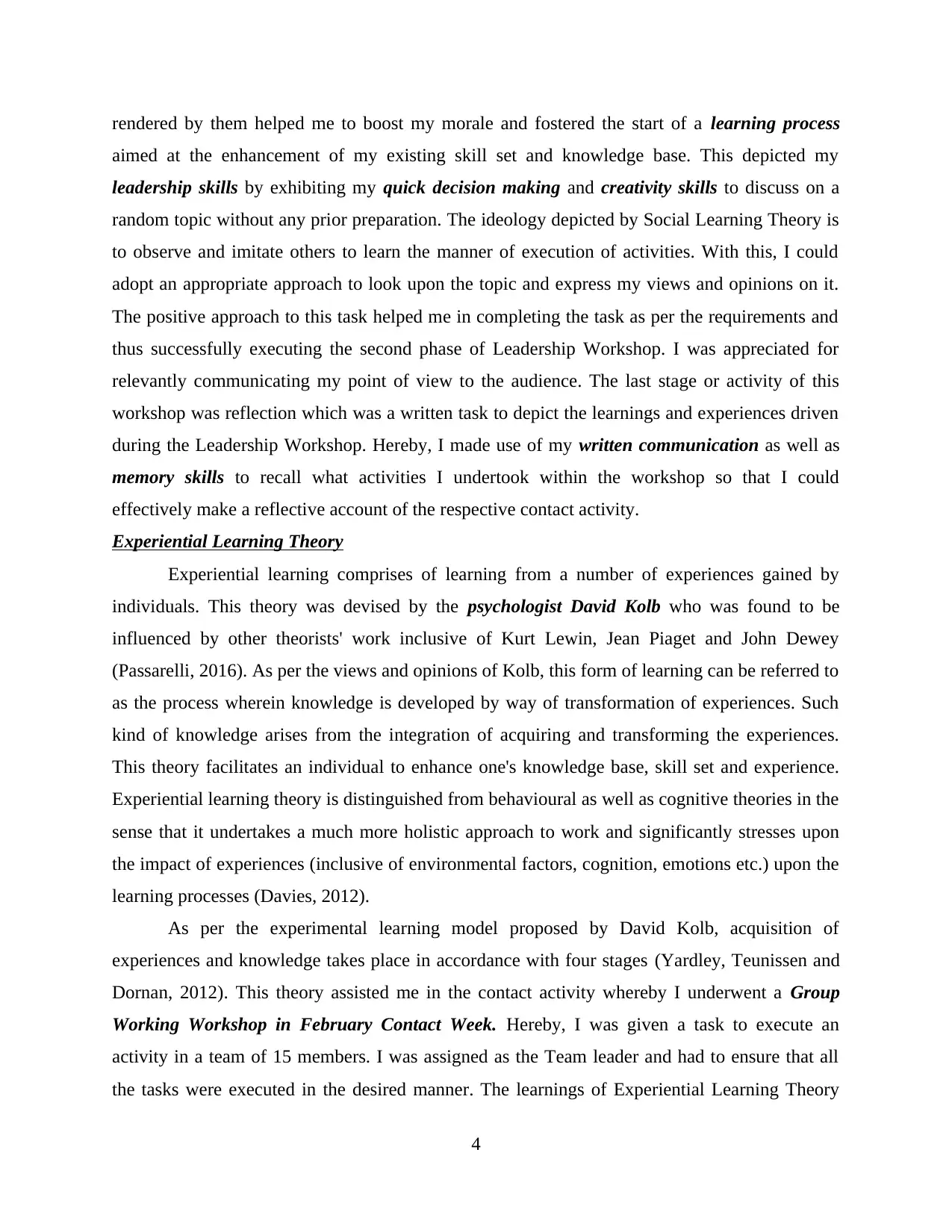
rendered by them helped me to boost my morale and fostered the start of a learning process
aimed at the enhancement of my existing skill set and knowledge base. This depicted my
leadership skills by exhibiting my quick decision making and creativity skills to discuss on a
random topic without any prior preparation. The ideology depicted by Social Learning Theory is
to observe and imitate others to learn the manner of execution of activities. With this, I could
adopt an appropriate approach to look upon the topic and express my views and opinions on it.
The positive approach to this task helped me in completing the task as per the requirements and
thus successfully executing the second phase of Leadership Workshop. I was appreciated for
relevantly communicating my point of view to the audience. The last stage or activity of this
workshop was reflection which was a written task to depict the learnings and experiences driven
during the Leadership Workshop. Hereby, I made use of my written communication as well as
memory skills to recall what activities I undertook within the workshop so that I could
effectively make a reflective account of the respective contact activity.
Experiential Learning Theory
Experiential learning comprises of learning from a number of experiences gained by
individuals. This theory was devised by the psychologist David Kolb who was found to be
influenced by other theorists' work inclusive of Kurt Lewin, Jean Piaget and John Dewey
(Passarelli, 2016). As per the views and opinions of Kolb, this form of learning can be referred to
as the process wherein knowledge is developed by way of transformation of experiences. Such
kind of knowledge arises from the integration of acquiring and transforming the experiences.
This theory facilitates an individual to enhance one's knowledge base, skill set and experience.
Experiential learning theory is distinguished from behavioural as well as cognitive theories in the
sense that it undertakes a much more holistic approach to work and significantly stresses upon
the impact of experiences (inclusive of environmental factors, cognition, emotions etc.) upon the
learning processes (Davies, 2012).
As per the experimental learning model proposed by David Kolb, acquisition of
experiences and knowledge takes place in accordance with four stages (Yardley, Teunissen and
Dornan, 2012). This theory assisted me in the contact activity whereby I underwent a Group
Working Workshop in February Contact Week. Hereby, I was given a task to execute an
activity in a team of 15 members. I was assigned as the Team leader and had to ensure that all
the tasks were executed in the desired manner. The learnings of Experiential Learning Theory
4
aimed at the enhancement of my existing skill set and knowledge base. This depicted my
leadership skills by exhibiting my quick decision making and creativity skills to discuss on a
random topic without any prior preparation. The ideology depicted by Social Learning Theory is
to observe and imitate others to learn the manner of execution of activities. With this, I could
adopt an appropriate approach to look upon the topic and express my views and opinions on it.
The positive approach to this task helped me in completing the task as per the requirements and
thus successfully executing the second phase of Leadership Workshop. I was appreciated for
relevantly communicating my point of view to the audience. The last stage or activity of this
workshop was reflection which was a written task to depict the learnings and experiences driven
during the Leadership Workshop. Hereby, I made use of my written communication as well as
memory skills to recall what activities I undertook within the workshop so that I could
effectively make a reflective account of the respective contact activity.
Experiential Learning Theory
Experiential learning comprises of learning from a number of experiences gained by
individuals. This theory was devised by the psychologist David Kolb who was found to be
influenced by other theorists' work inclusive of Kurt Lewin, Jean Piaget and John Dewey
(Passarelli, 2016). As per the views and opinions of Kolb, this form of learning can be referred to
as the process wherein knowledge is developed by way of transformation of experiences. Such
kind of knowledge arises from the integration of acquiring and transforming the experiences.
This theory facilitates an individual to enhance one's knowledge base, skill set and experience.
Experiential learning theory is distinguished from behavioural as well as cognitive theories in the
sense that it undertakes a much more holistic approach to work and significantly stresses upon
the impact of experiences (inclusive of environmental factors, cognition, emotions etc.) upon the
learning processes (Davies, 2012).
As per the experimental learning model proposed by David Kolb, acquisition of
experiences and knowledge takes place in accordance with four stages (Yardley, Teunissen and
Dornan, 2012). This theory assisted me in the contact activity whereby I underwent a Group
Working Workshop in February Contact Week. Hereby, I was given a task to execute an
activity in a team of 15 members. I was assigned as the Team leader and had to ensure that all
the tasks were executed in the desired manner. The learnings of Experiential Learning Theory
4
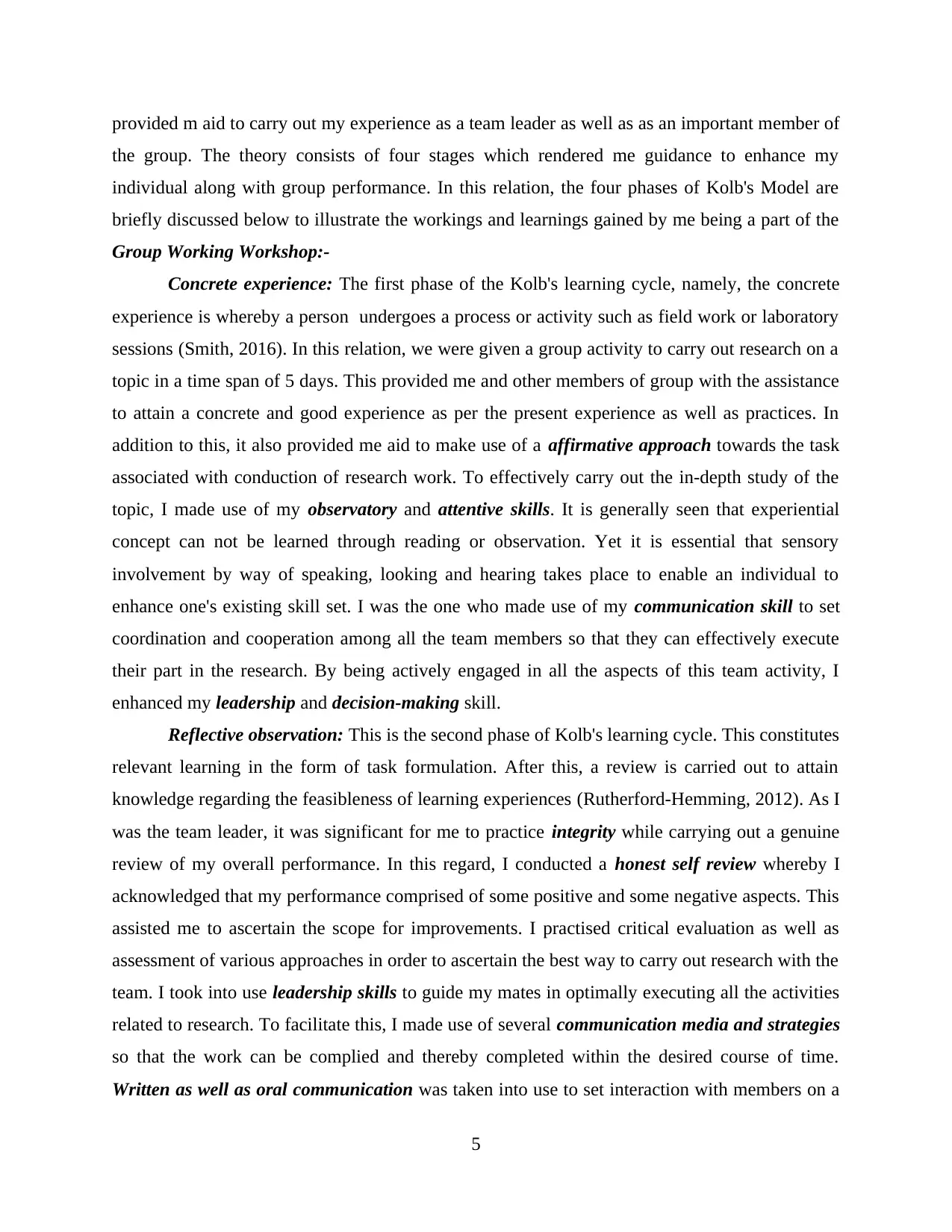
provided m aid to carry out my experience as a team leader as well as as an important member of
the group. The theory consists of four stages which rendered me guidance to enhance my
individual along with group performance. In this relation, the four phases of Kolb's Model are
briefly discussed below to illustrate the workings and learnings gained by me being a part of the
Group Working Workshop:-
Concrete experience: The first phase of the Kolb's learning cycle, namely, the concrete
experience is whereby a person undergoes a process or activity such as field work or laboratory
sessions (Smith, 2016). In this relation, we were given a group activity to carry out research on a
topic in a time span of 5 days. This provided me and other members of group with the assistance
to attain a concrete and good experience as per the present experience as well as practices. In
addition to this, it also provided me aid to make use of a affirmative approach towards the task
associated with conduction of research work. To effectively carry out the in-depth study of the
topic, I made use of my observatory and attentive skills. It is generally seen that experiential
concept can not be learned through reading or observation. Yet it is essential that sensory
involvement by way of speaking, looking and hearing takes place to enable an individual to
enhance one's existing skill set. I was the one who made use of my communication skill to set
coordination and cooperation among all the team members so that they can effectively execute
their part in the research. By being actively engaged in all the aspects of this team activity, I
enhanced my leadership and decision-making skill.
Reflective observation: This is the second phase of Kolb's learning cycle. This constitutes
relevant learning in the form of task formulation. After this, a review is carried out to attain
knowledge regarding the feasibleness of learning experiences (Rutherford-Hemming, 2012). As I
was the team leader, it was significant for me to practice integrity while carrying out a genuine
review of my overall performance. In this regard, I conducted a honest self review whereby I
acknowledged that my performance comprised of some positive and some negative aspects. This
assisted me to ascertain the scope for improvements. I practised critical evaluation as well as
assessment of various approaches in order to ascertain the best way to carry out research with the
team. I took into use leadership skills to guide my mates in optimally executing all the activities
related to research. To facilitate this, I made use of several communication media and strategies
so that the work can be complied and thereby completed within the desired course of time.
Written as well as oral communication was taken into use to set interaction with members on a
5
the group. The theory consists of four stages which rendered me guidance to enhance my
individual along with group performance. In this relation, the four phases of Kolb's Model are
briefly discussed below to illustrate the workings and learnings gained by me being a part of the
Group Working Workshop:-
Concrete experience: The first phase of the Kolb's learning cycle, namely, the concrete
experience is whereby a person undergoes a process or activity such as field work or laboratory
sessions (Smith, 2016). In this relation, we were given a group activity to carry out research on a
topic in a time span of 5 days. This provided me and other members of group with the assistance
to attain a concrete and good experience as per the present experience as well as practices. In
addition to this, it also provided me aid to make use of a affirmative approach towards the task
associated with conduction of research work. To effectively carry out the in-depth study of the
topic, I made use of my observatory and attentive skills. It is generally seen that experiential
concept can not be learned through reading or observation. Yet it is essential that sensory
involvement by way of speaking, looking and hearing takes place to enable an individual to
enhance one's existing skill set. I was the one who made use of my communication skill to set
coordination and cooperation among all the team members so that they can effectively execute
their part in the research. By being actively engaged in all the aspects of this team activity, I
enhanced my leadership and decision-making skill.
Reflective observation: This is the second phase of Kolb's learning cycle. This constitutes
relevant learning in the form of task formulation. After this, a review is carried out to attain
knowledge regarding the feasibleness of learning experiences (Rutherford-Hemming, 2012). As I
was the team leader, it was significant for me to practice integrity while carrying out a genuine
review of my overall performance. In this regard, I conducted a honest self review whereby I
acknowledged that my performance comprised of some positive and some negative aspects. This
assisted me to ascertain the scope for improvements. I practised critical evaluation as well as
assessment of various approaches in order to ascertain the best way to carry out research with the
team. I took into use leadership skills to guide my mates in optimally executing all the activities
related to research. To facilitate this, I made use of several communication media and strategies
so that the work can be complied and thereby completed within the desired course of time.
Written as well as oral communication was taken into use to set interaction with members on a
5
⊘ This is a preview!⊘
Do you want full access?
Subscribe today to unlock all pages.

Trusted by 1+ million students worldwide
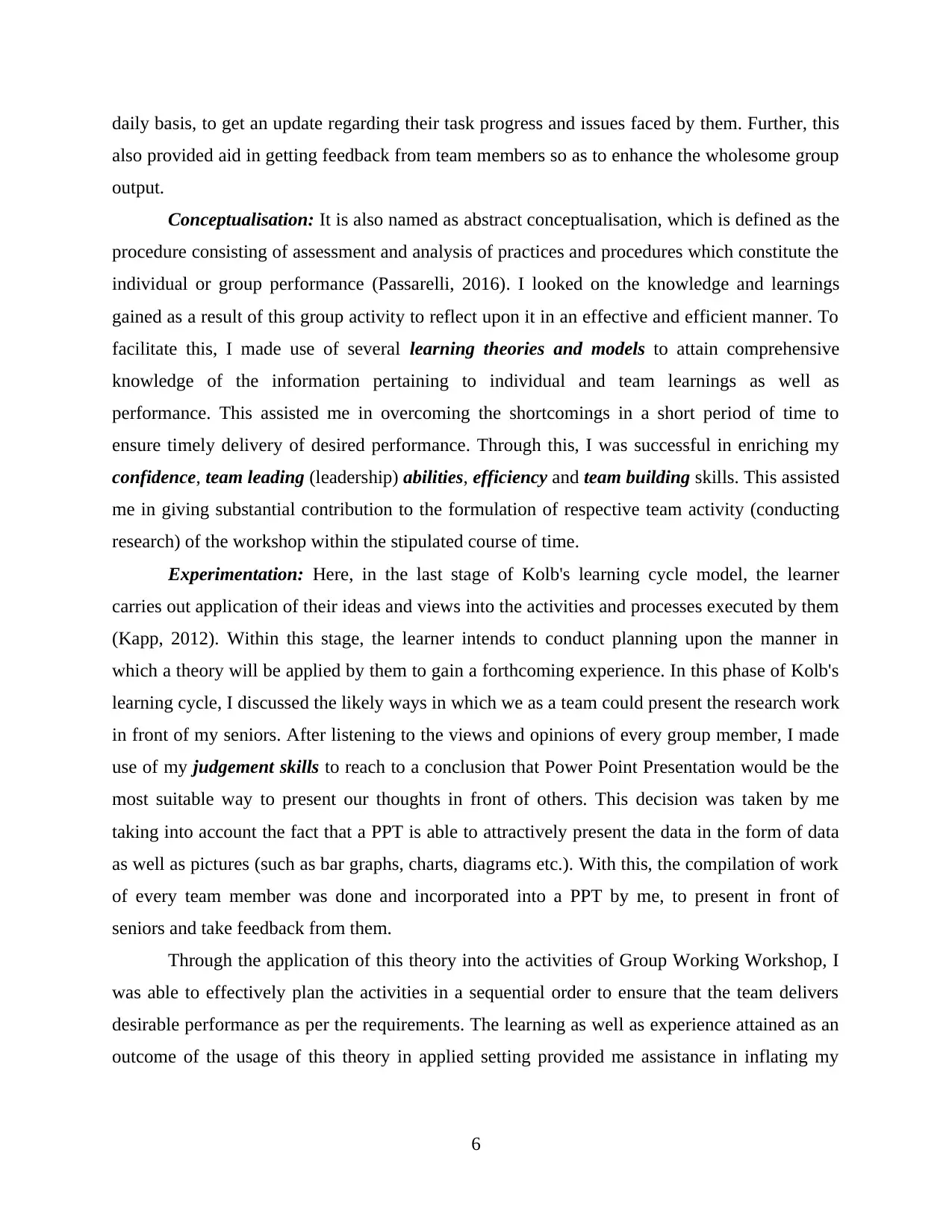
daily basis, to get an update regarding their task progress and issues faced by them. Further, this
also provided aid in getting feedback from team members so as to enhance the wholesome group
output.
Conceptualisation: It is also named as abstract conceptualisation, which is defined as the
procedure consisting of assessment and analysis of practices and procedures which constitute the
individual or group performance (Passarelli, 2016). I looked on the knowledge and learnings
gained as a result of this group activity to reflect upon it in an effective and efficient manner. To
facilitate this, I made use of several learning theories and models to attain comprehensive
knowledge of the information pertaining to individual and team learnings as well as
performance. This assisted me in overcoming the shortcomings in a short period of time to
ensure timely delivery of desired performance. Through this, I was successful in enriching my
confidence, team leading (leadership) abilities, efficiency and team building skills. This assisted
me in giving substantial contribution to the formulation of respective team activity (conducting
research) of the workshop within the stipulated course of time.
Experimentation: Here, in the last stage of Kolb's learning cycle model, the learner
carries out application of their ideas and views into the activities and processes executed by them
(Kapp, 2012). Within this stage, the learner intends to conduct planning upon the manner in
which a theory will be applied by them to gain a forthcoming experience. In this phase of Kolb's
learning cycle, I discussed the likely ways in which we as a team could present the research work
in front of my seniors. After listening to the views and opinions of every group member, I made
use of my judgement skills to reach to a conclusion that Power Point Presentation would be the
most suitable way to present our thoughts in front of others. This decision was taken by me
taking into account the fact that a PPT is able to attractively present the data in the form of data
as well as pictures (such as bar graphs, charts, diagrams etc.). With this, the compilation of work
of every team member was done and incorporated into a PPT by me, to present in front of
seniors and take feedback from them.
Through the application of this theory into the activities of Group Working Workshop, I
was able to effectively plan the activities in a sequential order to ensure that the team delivers
desirable performance as per the requirements. The learning as well as experience attained as an
outcome of the usage of this theory in applied setting provided me assistance in inflating my
6
also provided aid in getting feedback from team members so as to enhance the wholesome group
output.
Conceptualisation: It is also named as abstract conceptualisation, which is defined as the
procedure consisting of assessment and analysis of practices and procedures which constitute the
individual or group performance (Passarelli, 2016). I looked on the knowledge and learnings
gained as a result of this group activity to reflect upon it in an effective and efficient manner. To
facilitate this, I made use of several learning theories and models to attain comprehensive
knowledge of the information pertaining to individual and team learnings as well as
performance. This assisted me in overcoming the shortcomings in a short period of time to
ensure timely delivery of desired performance. Through this, I was successful in enriching my
confidence, team leading (leadership) abilities, efficiency and team building skills. This assisted
me in giving substantial contribution to the formulation of respective team activity (conducting
research) of the workshop within the stipulated course of time.
Experimentation: Here, in the last stage of Kolb's learning cycle model, the learner
carries out application of their ideas and views into the activities and processes executed by them
(Kapp, 2012). Within this stage, the learner intends to conduct planning upon the manner in
which a theory will be applied by them to gain a forthcoming experience. In this phase of Kolb's
learning cycle, I discussed the likely ways in which we as a team could present the research work
in front of my seniors. After listening to the views and opinions of every group member, I made
use of my judgement skills to reach to a conclusion that Power Point Presentation would be the
most suitable way to present our thoughts in front of others. This decision was taken by me
taking into account the fact that a PPT is able to attractively present the data in the form of data
as well as pictures (such as bar graphs, charts, diagrams etc.). With this, the compilation of work
of every team member was done and incorporated into a PPT by me, to present in front of
seniors and take feedback from them.
Through the application of this theory into the activities of Group Working Workshop, I
was able to effectively plan the activities in a sequential order to ensure that the team delivers
desirable performance as per the requirements. The learning as well as experience attained as an
outcome of the usage of this theory in applied setting provided me assistance in inflating my
6
Paraphrase This Document
Need a fresh take? Get an instant paraphrase of this document with our AI Paraphraser
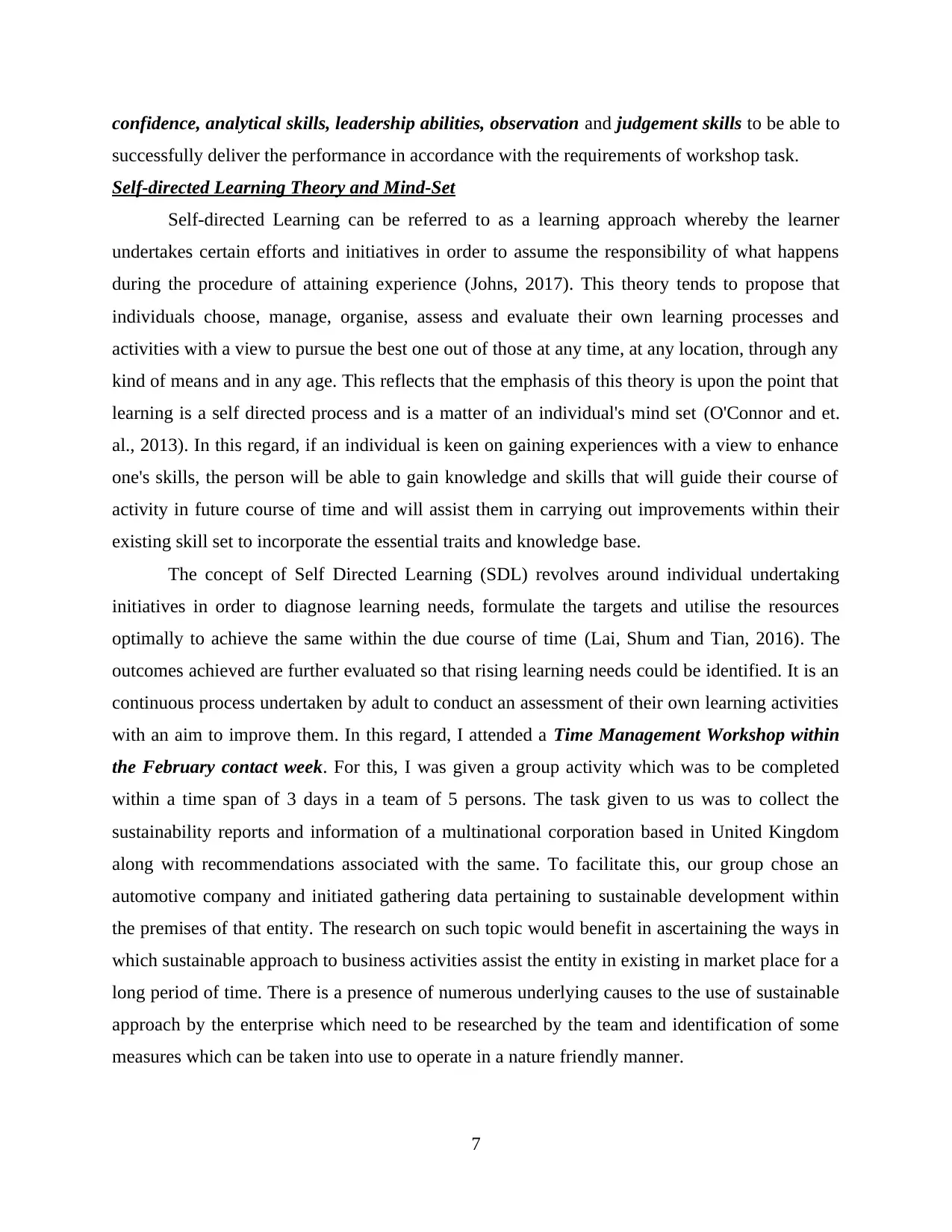
confidence, analytical skills, leadership abilities, observation and judgement skills to be able to
successfully deliver the performance in accordance with the requirements of workshop task.
Self-directed Learning Theory and Mind-Set
Self-directed Learning can be referred to as a learning approach whereby the learner
undertakes certain efforts and initiatives in order to assume the responsibility of what happens
during the procedure of attaining experience (Johns, 2017). This theory tends to propose that
individuals choose, manage, organise, assess and evaluate their own learning processes and
activities with a view to pursue the best one out of those at any time, at any location, through any
kind of means and in any age. This reflects that the emphasis of this theory is upon the point that
learning is a self directed process and is a matter of an individual's mind set (O'Connor and et.
al., 2013). In this regard, if an individual is keen on gaining experiences with a view to enhance
one's skills, the person will be able to gain knowledge and skills that will guide their course of
activity in future course of time and will assist them in carrying out improvements within their
existing skill set to incorporate the essential traits and knowledge base.
The concept of Self Directed Learning (SDL) revolves around individual undertaking
initiatives in order to diagnose learning needs, formulate the targets and utilise the resources
optimally to achieve the same within the due course of time (Lai, Shum and Tian, 2016). The
outcomes achieved are further evaluated so that rising learning needs could be identified. It is an
continuous process undertaken by adult to conduct an assessment of their own learning activities
with an aim to improve them. In this regard, I attended a Time Management Workshop within
the February contact week. For this, I was given a group activity which was to be completed
within a time span of 3 days in a team of 5 persons. The task given to us was to collect the
sustainability reports and information of a multinational corporation based in United Kingdom
along with recommendations associated with the same. To facilitate this, our group chose an
automotive company and initiated gathering data pertaining to sustainable development within
the premises of that entity. The research on such topic would benefit in ascertaining the ways in
which sustainable approach to business activities assist the entity in existing in market place for a
long period of time. There is a presence of numerous underlying causes to the use of sustainable
approach by the enterprise which need to be researched by the team and identification of some
measures which can be taken into use to operate in a nature friendly manner.
7
successfully deliver the performance in accordance with the requirements of workshop task.
Self-directed Learning Theory and Mind-Set
Self-directed Learning can be referred to as a learning approach whereby the learner
undertakes certain efforts and initiatives in order to assume the responsibility of what happens
during the procedure of attaining experience (Johns, 2017). This theory tends to propose that
individuals choose, manage, organise, assess and evaluate their own learning processes and
activities with a view to pursue the best one out of those at any time, at any location, through any
kind of means and in any age. This reflects that the emphasis of this theory is upon the point that
learning is a self directed process and is a matter of an individual's mind set (O'Connor and et.
al., 2013). In this regard, if an individual is keen on gaining experiences with a view to enhance
one's skills, the person will be able to gain knowledge and skills that will guide their course of
activity in future course of time and will assist them in carrying out improvements within their
existing skill set to incorporate the essential traits and knowledge base.
The concept of Self Directed Learning (SDL) revolves around individual undertaking
initiatives in order to diagnose learning needs, formulate the targets and utilise the resources
optimally to achieve the same within the due course of time (Lai, Shum and Tian, 2016). The
outcomes achieved are further evaluated so that rising learning needs could be identified. It is an
continuous process undertaken by adult to conduct an assessment of their own learning activities
with an aim to improve them. In this regard, I attended a Time Management Workshop within
the February contact week. For this, I was given a group activity which was to be completed
within a time span of 3 days in a team of 5 persons. The task given to us was to collect the
sustainability reports and information of a multinational corporation based in United Kingdom
along with recommendations associated with the same. To facilitate this, our group chose an
automotive company and initiated gathering data pertaining to sustainable development within
the premises of that entity. The research on such topic would benefit in ascertaining the ways in
which sustainable approach to business activities assist the entity in existing in market place for a
long period of time. There is a presence of numerous underlying causes to the use of sustainable
approach by the enterprise which need to be researched by the team and identification of some
measures which can be taken into use to operate in a nature friendly manner.
7
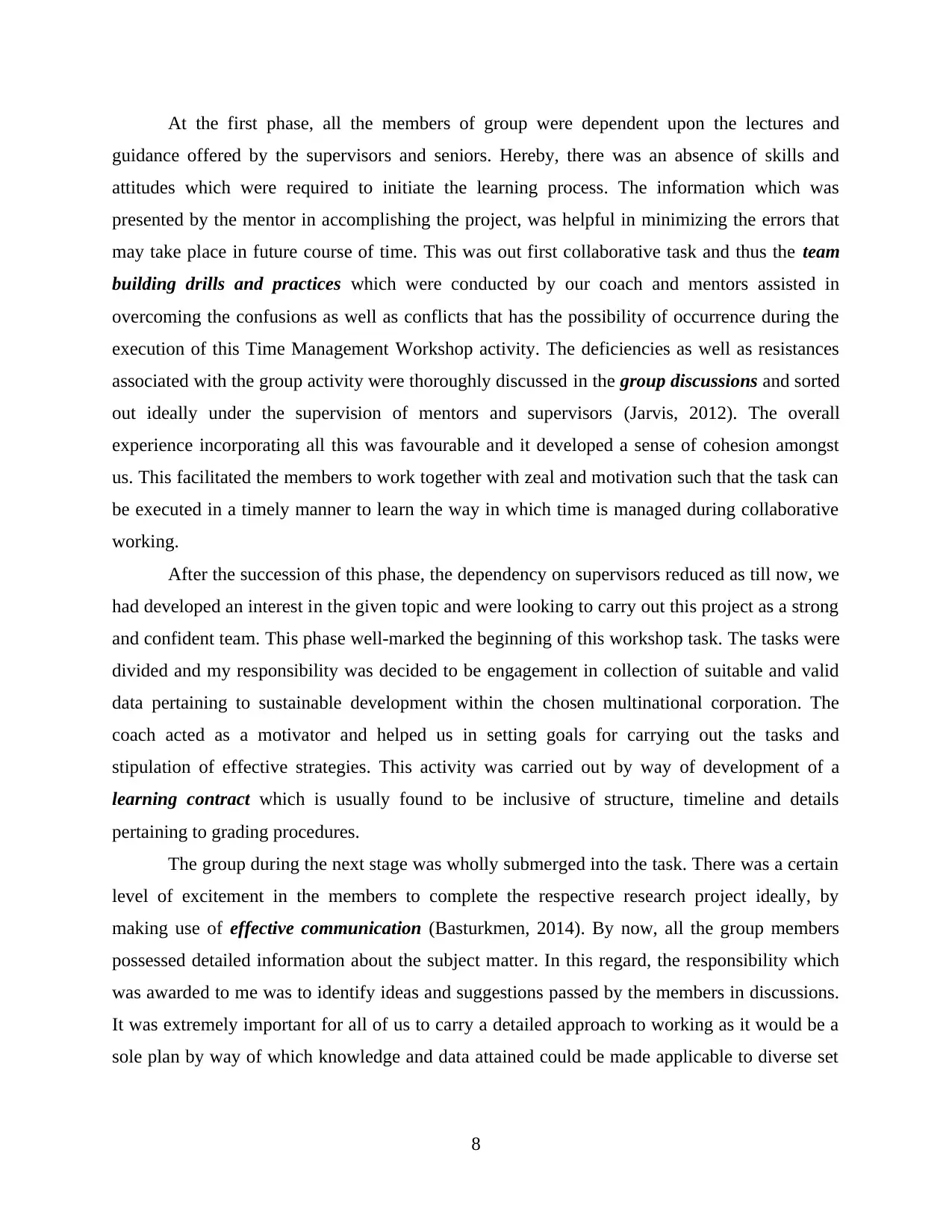
At the first phase, all the members of group were dependent upon the lectures and
guidance offered by the supervisors and seniors. Hereby, there was an absence of skills and
attitudes which were required to initiate the learning process. The information which was
presented by the mentor in accomplishing the project, was helpful in minimizing the errors that
may take place in future course of time. This was out first collaborative task and thus the team
building drills and practices which were conducted by our coach and mentors assisted in
overcoming the confusions as well as conflicts that has the possibility of occurrence during the
execution of this Time Management Workshop activity. The deficiencies as well as resistances
associated with the group activity were thoroughly discussed in the group discussions and sorted
out ideally under the supervision of mentors and supervisors (Jarvis, 2012). The overall
experience incorporating all this was favourable and it developed a sense of cohesion amongst
us. This facilitated the members to work together with zeal and motivation such that the task can
be executed in a timely manner to learn the way in which time is managed during collaborative
working.
After the succession of this phase, the dependency on supervisors reduced as till now, we
had developed an interest in the given topic and were looking to carry out this project as a strong
and confident team. This phase well-marked the beginning of this workshop task. The tasks were
divided and my responsibility was decided to be engagement in collection of suitable and valid
data pertaining to sustainable development within the chosen multinational corporation. The
coach acted as a motivator and helped us in setting goals for carrying out the tasks and
stipulation of effective strategies. This activity was carried out by way of development of a
learning contract which is usually found to be inclusive of structure, timeline and details
pertaining to grading procedures.
The group during the next stage was wholly submerged into the task. There was a certain
level of excitement in the members to complete the respective research project ideally, by
making use of effective communication (Basturkmen, 2014). By now, all the group members
possessed detailed information about the subject matter. In this regard, the responsibility which
was awarded to me was to identify ideas and suggestions passed by the members in discussions.
It was extremely important for all of us to carry a detailed approach to working as it would be a
sole plan by way of which knowledge and data attained could be made applicable to diverse set
8
guidance offered by the supervisors and seniors. Hereby, there was an absence of skills and
attitudes which were required to initiate the learning process. The information which was
presented by the mentor in accomplishing the project, was helpful in minimizing the errors that
may take place in future course of time. This was out first collaborative task and thus the team
building drills and practices which were conducted by our coach and mentors assisted in
overcoming the confusions as well as conflicts that has the possibility of occurrence during the
execution of this Time Management Workshop activity. The deficiencies as well as resistances
associated with the group activity were thoroughly discussed in the group discussions and sorted
out ideally under the supervision of mentors and supervisors (Jarvis, 2012). The overall
experience incorporating all this was favourable and it developed a sense of cohesion amongst
us. This facilitated the members to work together with zeal and motivation such that the task can
be executed in a timely manner to learn the way in which time is managed during collaborative
working.
After the succession of this phase, the dependency on supervisors reduced as till now, we
had developed an interest in the given topic and were looking to carry out this project as a strong
and confident team. This phase well-marked the beginning of this workshop task. The tasks were
divided and my responsibility was decided to be engagement in collection of suitable and valid
data pertaining to sustainable development within the chosen multinational corporation. The
coach acted as a motivator and helped us in setting goals for carrying out the tasks and
stipulation of effective strategies. This activity was carried out by way of development of a
learning contract which is usually found to be inclusive of structure, timeline and details
pertaining to grading procedures.
The group during the next stage was wholly submerged into the task. There was a certain
level of excitement in the members to complete the respective research project ideally, by
making use of effective communication (Basturkmen, 2014). By now, all the group members
possessed detailed information about the subject matter. In this regard, the responsibility which
was awarded to me was to identify ideas and suggestions passed by the members in discussions.
It was extremely important for all of us to carry a detailed approach to working as it would be a
sole plan by way of which knowledge and data attained could be made applicable to diverse set
8
⊘ This is a preview!⊘
Do you want full access?
Subscribe today to unlock all pages.

Trusted by 1+ million students worldwide
1 out of 18
Related Documents
Your All-in-One AI-Powered Toolkit for Academic Success.
+13062052269
info@desklib.com
Available 24*7 on WhatsApp / Email
![[object Object]](/_next/static/media/star-bottom.7253800d.svg)
Unlock your academic potential
Copyright © 2020–2026 A2Z Services. All Rights Reserved. Developed and managed by ZUCOL.





